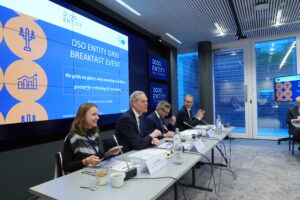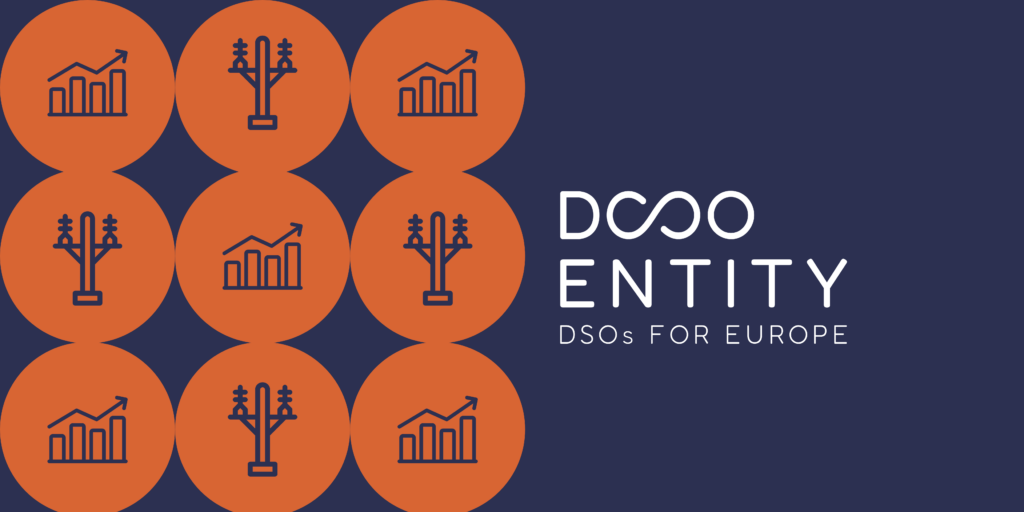On 9 April, DSO Entity hosted its Breakfast Event “No grids, no glory: why investing in grids is pivotal for a thriving EU economy”. High-level panellists, among whom DSO Entity President, Mr. Vincenzo Ranieri, Member of the EU Parliament, Ms. Anna Stürgkh (Renew, Austria), and Head of Unit of DG ENER C.4, Mr. Joachim Balke exchanged on how to revive the EU’s competitiveness and the role of grids.
Our President, Vincenzo Ranieri, opened the discussion by showing the relevance and added value of grids for the EU’s economy and society. With more than 250 million customers and industrial and commercial users and 800,000 direct and indirect jobs in distribution grids, DSOs are key to the EU’s competitiveness and drive positive impacts on GDP through investments.
Supporting affordable energy from the grid side: What is needed?
Vincenzo Ranieri reaffirmed the importance of a grid mainstreaming approach to ensure DSOs’ needs are considered in every new and revised regulation and presented the conditions needed for grids to support an affordable energy system:
- Significant investments in digitalized, flexible and resilient grid infrastructure contribute to connecting renewables and reducing grid congestion costs.
- Anticipatory investments to ensure a cost-efficient transition, which will lead to lower network tariffs in the long run.
- The need for (EU and national) public funding for DSOs through a necessary reform of the TEN-E regulation, but also a specific new dedicated grid facility and better earmarking of nationally managed funds.
- Incentivizing grid-friendly behavior to optimize the network usage and encourage active consumer engagement.
Highlights from European Parliament and European Commission
- Vincenzo Ranieri’s keynote speech was followed by interventions from the European Parliament and the European Commission providing insights into the priorities and planned initiatives for both institutions.
- MEP Anna Stürgkh: The rapporteur of the Parliament’s own initiative report on electricity grids started her intervention by highlighting the relevance of grids for the EU’s competitiveness stressing the importance of raising awareness among European citizens on their role as well as the need to accelerate the digitalization and resilience of the grids. She called for an increase of the CEF-E budget as well as better funding opportunities for DSOs and access to EIB funding. She also underlined the role of national funding and the need to make more efficient use of existing funds to redirect them towards DSOs. Furthermore, she underlined the need for more integrated and forward-looking network planning, for which DSO Entity and ENTSO-E play an important role, supported by anticipatory investments, accelerated electrification and stronger supply chains.
- Joachim Balke, Deputy Head of Unit DG ENER C4, provided the European Commission’s perspective building on the recently published Clean Industrial Deal and Affordable Energy Action Plan. Amongst the core contributions of DSOs to reducing energy costs, he stressed the need to invest in infrastructure and have efficient network tariffs to ensure a fair distribution of electricity among customers and avoid an increase of EUR 26 billion in grid management cost by 2030. Among the EUR 480 billion of the next Multi-Annual Financial Framework (MFF) period, 67% are estimated to be geared at the distribution level and Mr. Balke reflected on the Commission’s intention to present Guidance on network tariffs and use of public funds in Q2 2025 and a Clean Energy Investment Strategy later this year. Joachim Balke pointed out the remaining challenges related to grid infrastructure among which the aging network, the systemic changes with the integration of decentralized energy sources resulting in an increasing number of grid connection requests. He underlined the important contribution of DSOs to ensure lower energy prices by connecting renewables and other electricity loads to the grid by efficiently managing grid queues referring to the upcoming guidance on grid connections planned for the end of 2025. He reflected on the intention of the Commission to address other obstacles to grid build-out such as permitting, with plans to propose measures to reduce permitting times, and supply chain with an upcoming Grid Manufacturing Package to be developed by the EIB.
“We need to increase grid build-out at all levels.”
Joachim Balke, Head of Unit C4, DG ENER
Next steps: Looking towards the European Grid Package in Q4 2025
While the EU Grid Action Plan will achieve its delivery in June during the next edition of the Copenhagen Infrastructure Forum, the Commission announced in its Affordable Energy Action Plan an upcoming dedicated package to investigate the EU regulatory framework and outstanding challenges for European grids.
Mr. Balke provided insights into the Commission’s plans for the European Grid Package planned for the end of the year and expected to address the outstanding grid challenges with simplified rules on grids through revised governance and TEN-E, strengthened investments and funding with new financing models, a more comprehensive network planning with increased visibility and cross-sector alignment, accelerated permitting, and enhanced resilience of infrastructure. He concluded by calling participants to provide input to the upcoming call for evidence planned for May.
DSO Entity’s role and importance of stakeholder cooperation to deliver EU’s objectives
The event resumed with key contributions from the audience, notably from CEER, IFIEC and ENTSO-E partners, highlighting the essential role of cooperation to address the challenges including investment via public and private funding, network tariffs, strengthened supply chain and need for a level playing field for grids to reach independence from fossil fuels.
Both MEP Anna Stürgkh and Joachim Balke welcomed DSO Entity’s work acknowledging its key role and helpful collaboration in delivering on the EU Grid Action Plan and achieving all EU objectives.
Thanks to the lively interactions in the room, the event was the opportunity to show the high level of commitments of all stakeholders to cooperate and deliver on the EU’s ambitions for a decarbonized, competitive and resilient continent in a fast-evolving geopolitical world. DSO Entity thanks all speakers and attendees for their active participation and valuable insights and look forward to next occasions to continue raising awareness on DSOs and exchanging ideas and solutions.



